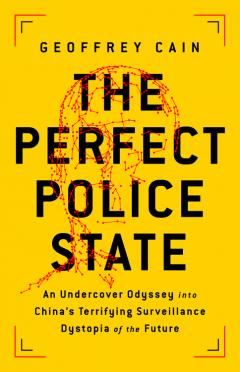High-tech dystopian future has arrived for China’s Uyghurs, author says
Chinese Uyghurs wake up next to government minders. They are monitored 24 hours a day by a television camera in their homes. Their spouses have been taken away for unclear reasons to a concentration camp.
This is reality in Xinjiang Province, China, journalist and author Geoffrey Cain told a National Press Club audience via live video on Friday, describing a “very eerie, dark, rapid deterioration” of the region.
“It just blew me away,” he said of a 2017 trip there, where he stepped into a landscape thick with cameras and a palpable, “truly terrifying” sense of being watched around the clock by a web of electronic eyes.
 He said facial scans, store purchases and other data were swept into a massive system called the Integrated Joint Operations Platform that uses artificial intelligence to predict crimes.
He said facial scans, store purchases and other data were swept into a massive system called the Integrated Joint Operations Platform that uses artificial intelligence to predict crimes.
“It was beyond anything I had seen before and I knew … that it was going to become a major lesson, not just for what is happening in China and the Uyghur people of China, but for humanity, for how we adopt new technologies, how we govern them, how we ensure they are in the right hands, that they don’t get out of control," he said, "This is the worst-case scenario."
Cain said 1.8 million people are being housed in a network of concentration camps that the Chinese government calls “vocational skills education centers” and denies reports of abuse.
Crain said he wanted to warn about authoritarian governments weaponizing Silicon Valley technology. He said he interviewed dozens of sources, including Uyghurs who were incarcerated and escaped, for his book, “The Perfect Police State: An undercover odyssey into China’s terrifying surveillance dystopia of the future.”
The day-to-day existence of Uyghurs – a Turkic Muslim ethnic group – in Xinjiang “is one of 24/7 monitoring and surveillance by the state, by the police,” he said.
“Let’s say, you would wake up in the morning, and if you’re a woman, you might actually wake up by a man who was sent there by the Communist Party to teach your family Communist Party values, loyalty to the state, making sure that you are a good patriot,” asking questions and teaching lessons and “making sure your thinking is in line, that you’re not committing some kind of thought crime against the state,” Cain said.
The minder might have been “sent to replace, say, your husband or your partner who had been taken away to a concentration camp” because the police determined he was likely to commit a crime.
Concentration camp prisoners are wiped clean of their identities with brainwashing and psychological torture and deployment of mental exercises designed to make them question their version of reality, Cain said. “The intense suffering and surveillance in this region, I think it’s beyond what we’ve seen before in this region and among” authoritarian regimes," he said.
“This is the sci-fi dystopia that the old authors like George Orwell feared,” Cain said. “I would consider this to be the non-fiction incarnation of what these authors were writing about 50 or 60 years ago.”
The use of technology sets Xinjiang apart and should give the rest of the world cause to be vigilant, Cain said. He recommended journalists should protect themselves and their electronic devices from the eyes of prying governments, such as not using Facebook or Twitter to send messages and keeping sensitive files on a USB drive rather than the cloud.
